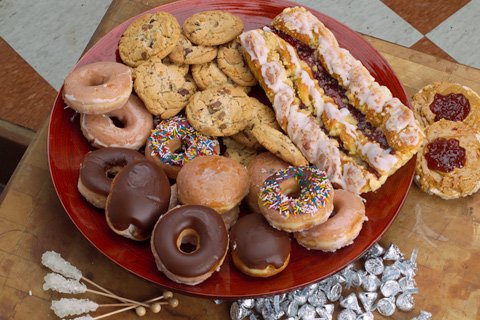From magazine racks to TV commercials we are bombarded with information on the latest diet crazes every day. The ads always say that "this popular diet doesn't work, but ours will" or they show a photoshopped before and after picture. And although the term diet automatically gets you thinking of people who need to lose weight, its Merriam-Webster definition is: "the food or drink prescribed to a person for a special reason".
So for those who play sports or have goals of muscle gain, having the proper diet is important as well. Many people don't change what they eat or drink at all when it comes to sports performance or gaining muscle, they simply think that because they are not trying to lose weight, all they need is a supplement to attain their goals. This is simply not true, a supplement is exactly what the name implies; it's a tool that strengthens, completes, or makes up for a deficiency in your diet. It is not an automatic means to an end.
The next time you buy a fat burner and you ask someone: "How quickly will this work for me?"; remember, the fat burner is limited by your diet and training, how quickly it works depends on your dedication. Also, for those of you out there who consider themselves "natural" in the sense that they don't need supplements, remember this: The majority of sports nutritional products contain ingredients naturally occurring in your diet (Ex: BCAA's and creatine are found in red meat, citrulline is found in watermelon) in concentrated amounts in an attempt to improve convenience, bioavailability and effect. If you think you can do without supplements consider that 2lbs of steak has 4 grams of creatine and 119 grams of fat to go along with it.1

 Click To Enlarge.
Click To Enlarge. A Fat Burner Is Limited By Your Diet And Training And How
Quickly It Works Depends On Your Dedication.
But now back to the idea of dieting; I will discuss the ins and outs of dieting as it pertains to weight loss for the average person who doesn't plan on competing in a show anytime soon, and dieting for proper weight maintenance.

The Atkins Diet
Quite possibly the most popular weight loss craze in recent memory is that of the Atkins Diet (low carb) and the reason for this is because it works. Individuals could achieve faster results on the low carb diet as opposed to a calorie restricted diet.2
The reason for this is the effect of insulin; carbohydrates (and to a lesser extent, protein and essential amino acids) cause the pancreas to release insulin which shuts down the release of fatty acids (your body metabolizes fat at rest) and pulls nutrients from the blood to be utilized or stored. This process is highly anabolic and very useful for athletes attempting to refill their energy stores (muscle glycogen is the storage form of carbohydrates in the body and it is utilized during intense exercise) and transport vital nutrients to muscle cells.

 Click To Enlarge.
Click To Enlarge. Individuals Could Achieve Faster Results On The Low Carb Diet
As Opposed To A Calorie Restricted Diet.
However, this process is detrimental to those attempting to lose fat if it is happening during the day and not post exercise. So if you're in the office munching on donuts, or you're at a restaurant eyeing the dessert menu; remember, it's not just the calories that you have to be worried about. In general (not including carbohydrate supplements) the faster the digestion rate of the carbohydrates you consume (things like sugar, or refined carbohydrates) the more insulin you will have released. The term "Glycemic Index" refers to a foods effect on blood glucose (blood sugar) levels and subsequently insulin levels. This explains why some people can simply stop drinking sugary sodas alone and see a change in their weight. They have spent so much time shutting down their body's use of its fat stores they are surprised when they witness what can happen from such a simple lifestyle change.
It's not the sugar and refined carbohydrates alone that are the culprits, when many people are having desserts there are large amounts of sugar accompanied by fat. Remember as I stated earlier, athletes use high glycemic carbohydrates after exercise to store vital nutrients (mainly protein for rebuilding muscle tissue damaged during exercise). When it comes to a dessert, the only thing your body is storing is fat. So not only are you blocking fat release, but you're promoting fat storage.

 Click To Enlarge.
Click To Enlarge. When Many People Are Having Desserts There Are Large
Amounts Of Sugar Accompanied By Fat.

The Truths Of The Low Carb Diet
So now you're probably wondering...okay, this proves that the low carb diet is 100% legitimate right? Well, not quite. The rule of thumb for everything in bodybuilding in nutrition is to take good things in moderation. There is a time and a place for low carb dieting; for the average gym rat it's a great 4-6 week diet to get ready for spring break, for a natural bodybuilder it's great for the last 4 weeks of your diet to make sure you're peeled and to take advantage of carbohydrate loading to get the most out of your physique. For the average person, the low carb diet is a great way to lose weight during the opening weeks of your lifestyle changes (I prefer using the term "lifestyle change" because if you approach something as a temporary diet, you will almost surely gain the weight back).
The same research that showed how quickly a low carbohydrate diet works compared to a low fat diet also brought to light the fact that in the long run both diets were equal in long term weight loss.2 The downside, however, is that LDL cholesterol is increased with the low carbohydrate diet and this is linked to detrimental health in the long term (atherosclerosis, heart disease). So despite the latest diet crazes and the claims of speedy weight loss, the one thing to keep in mind is that long term results come down to total calories. Long term success will always come down to expending more calories than you take in.
 |
The Types Of Cholesterol? LDL Cholesterol - Low-density lipoprotein (LDL) is one of the five major groups of lipoproteins, which in order of size, largest to smallest, are chylomicrons, VLDL, IDL, LDL and HDL, that enable lipids like cholesterol and triglycerides to be transported within the water-based bloodstream.Since higher levels of LDL particles promote health problems and cardiovascular disease, they are often called the bad cholesterol particles, (as opposed to HDL particles, which are frequently referred to as good cholesterol or healthy cholesterol particles). HDL Cholesterol - High-density lipoprotein (HDL) is one of the five major groups of lipoproteins which, in order of sizes, smallest to largest, are chylomicrons, VLDL, IDL, LDL and HDL, which enable lipids like cholesterol and triglycerides to be transported within the water-based bloodstream. In healthy individuals, about thirty percent of blood cholesterol is carried by HDL |
 |
 |
||
Take in to account the recent Mr. Olympia winner Jay Cutler who won his title using a high carbohydrate diet while keeping his total calories in check.3 The carbohydrates Jay took in helped release insulin which worked to preserve his muscle mass while dieting (similar to the way protein helps maintain muscle mass during a low carb diet) which resulted in him putting a limit on the total amount of fat in his diet.

Dieting For Weight Maintenance
Now when it comes to dieting for weight maintenance, the base of your approach should once again be the total calories you consume in a day. However, as I stated in my article on bulking while limiting fat; insulin still plays a role in weight control. If it didn't, Sumo wrestlers wouldn't limit their eating to twice a day to promote insulin spikes (they also limit their number of meal sessions per day to slow metabolic rate). And also, if insulin didn't play a role in weight control, the atkins/low carb diet wouldn't
So for those looking to maintain, the key is to eat small meals (or regular meals with snacks in between) throughout the day, preferably every 3 hours. Despite what you may have heard, this does nothing to speed up your metabolism. It is simply the best method to prevent insulin from spiking and to help control the size of your meals (to help prevent overeating). The other factor to consider is the amount of carbohydrates you consume in comparison to the rest of the macronutrients in your diet. This is something I also discussed in my Bulking article; carbohydrates are the main source of our body's fuel during exercise, and should only be consumed to match the volume of your training. This is especially important today since many Americans consume a large amount of processed foods and high glycemic carbohydrates.
The best way to maintain your weight is to monitor your caloric intake for the day and monitor the total carbohydrates you take in. A good way to balance your macronutrients is to take into account the total calories you will consume for the day, have 40 carbohydrates, 30% protein (roughly .8 grams per pound of bodyweight, this is the National Strength and Conditioning Association recommendation), and 30% in healthy fats (Omega 3, poly and mono-unsaturated fats, limit saturated fat).
At this point your probably asking yourself, "Does this mean I have to do cardio every time I want to enjoy myself with a dessert or fatty food?". Well, here's the good news; first, it takes 3,500 excess calories to develop a pound of fat, so having a dessert, or a steak every once in a while won't hurt if your on point with exercise. The second thing to keep in mind is the post-exercise window. It is important to consume carbohydrates as well as protein post exercise to optimize muscle glycogen replenishment and recovery. However, after intense exercise energy expenditure and utilization is high enough that fatty or high carbohydrate meals are limited in there ability to be stored as fat because of increased lipid oxidation, and the need for muscle glycogen replenishment.4

Conclusion
So despite the latest diet trends that come and go, modern science tells us that the best things for weight control are: optimizing your metabolism through regular exercise, balancing your meals for proper insulin control, and keeping an eye on the total number of calories you consume for the day. And when it comes to the meal delivery services that are so heavily advertised, those can definitely help if you have the extra money to spend and have a hard time with planning your diet. But for those of us who can't afford it, these meal plans are based on what every nutritionist prescribes to their clients the first day they walk into the office...portion control. This is the reason for the 6 meal a day recommendation that is recommended for so many people just getting started. Compliance is a huge issue in the personal training and nutrition planning industry, and the first thing you will be taught just starting out is to start controlling the portions of your meals and start paying attention to serving sizes. This should help get you on your way and on the track to weight control success.
References:
- Ray Sahelian M.D., Dave Tuttle. Creatine: Nature's Muscle Builder. Avery Publishing Group, 1996).2.
- Alain J. Nordmann, MD, MSc; Abigail Nordmann, BS; Matthias Briel, MD; Ulrich Keller, MD; William S. Yancy, Jr, MD, MSH; Bonnie J. Brehm, PhD; Heiner C. Bucher, MD, MPH . Effects of Low-Carbohydrate vs Low-Fat Diets on Weight Loss and Cardiovascular Risk Factors. Arch Intern Med. 2006;166:285-293
- "How I won the 2006 Mr. Olympia". Flex Magazine 2007.
- R Bielinski, Y Schutz and E Jequier. Energy metabolism during the postexercise recovery in man. American Journal of Clinical Nutrition, Vol 42, 69-82
